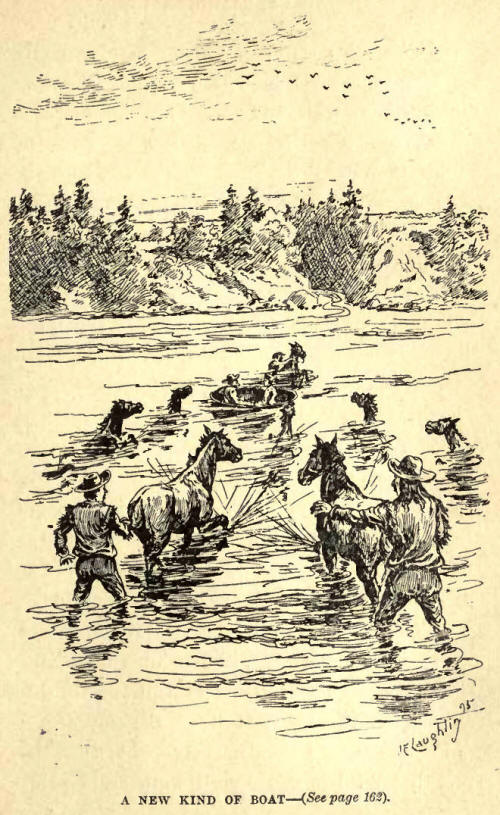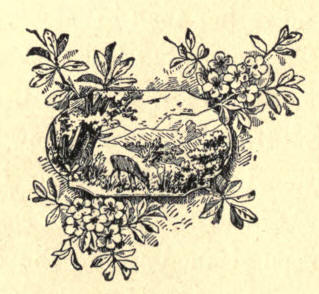|
THURSDAY evening found us
striking southward, Mr. Woolsey and his interpreter, William Monckman,
making our party up to five. Peter was guide and father's interpreter. Both
positions he was well able to fill.
Because of Mr. Woolsey's
physical infirmity, we were obliged to travel more slowly than we had thus
far.
Our road ran along the east
side of Smoking Lake, and down the creek which runs from the lake to the
Saskatchewan. We had left most of the ox for the men at the Mission, and
were to depend upon our guns for food until we should reach the Indian camp
on the plains. We shot some ducks for supper and breakfast the first night
out, and reached the north bank of the river Friday afternoon. The
appearance of the country at this point and in its vicinity pleased father
so much that he suggested to Mr. Woolsey the desirability of moving to this
place and founding a mission and settlement right here on the banks of the
river, all of which Mr. Woolsey readily acquiesced in.
The two missionaries,
moreover, decided that the name of the new mission should be Victoria.
The next move was to cross
this wide and swiftly flowing river. No ferryman appeared to answer our
hail. No raft or canoe or boat was to be seen, no matter where you might
look. Evidently something must be improvised, and, as it turned out, Peter
was equal to the occasion.
Father and Mr. Woolsey had
gone to further explore the site of the new mission, William was guarding
the horses, and Peter was left with myself to bridge the difficulty, which,
to me, seemed a great one. If we had even a small dugout or log canoe, I
would have been at home.
But what is Peter going to do
?" was the question I kept asking myself. Presently I said, "How are we
going to cross?" "Never you mind," said he; "do as I tell you." "All right,"
said I; and soon I received my instructions, which were to go and cut two
straight, long green willows about one and a half inches in diameter. I did
so, and Peter took these and with them made a hoop. While he was making this
he told me to bring the oilcloth we were carrying with us and to spread it
on the beach. Then he placed the hoop in the centre of the oilcloth, and we
folded it in on to the hoop from every side. Then we carried our saddles,
and blankets, and tent, and kettle, and axe—in short, everything we had, and
put them in this hoop. Then William came and helped us carry this strange
thing into the water. When we lifted by the hoop or rim our stuff sagged
down in the centre, and when we placed the affair in the water, to my great
astonishment it floated nicely, and I was told to hold it in the current;
and Peter, calling to the missionaries, said, "Take off your shoes,
gentlemen, and wade out and step into the boat." I could hardly credit this;
but the gentlemen did as bidden, and very soon were sitting in the hoop, and
still, to my great wonder, it floated.
Peter, in the meantime, took
a "chawed line."

This is made of buffalo hide,
and is literally what its name signifies, having been made by cutting some
green hide into a strand, about an inch or more wide, and stretching this,
and as it dried, scraping the hair and flesh from it. When thoroughly dry
the manufacturer began at one end and chewed it through to the other end,
and then back again, and continued this until the line was soft and pliable
and thoroughly tanned for the purpose. Great care was taken while chewing
not to let the saliva touch the line. These lines were in great demand for
lassos, and packing horses, and lashing dog sleighs and as bridles.
Peter tied one end of this
securely to the rim of the hoop, and then brought a horse close and tied the
other end of the line to the horse's tail; then fastening a leather hobble
to the under jaw of the horse, he vaulted on to its back and rode out into
the stream, saying to me, "Let go, John, when the line comes tight;" and
gently and majestically, like a huge nest, with the two missionaries sitting
as eaglets in it, this strange craft floated restfully on the current.
For a moment I stood in
amazement; then the fact that William and myself were still on this side
made me shout to Peter, "How are we to cross?" By this time he was swimming
beside his horse, and back over the water came the one word, cc Swim !" then
later, "Drive in the horses and take hold of the tail of one and he will
bring you across." I could swim, but when it came to stemming the current of
the Saskatchewan, that was another matter.
However, William and I did as
our guide ordered, and soon we were drying ourselves on the south bank,
horses and men and kit safely landed. The willow pole and our oilcloth had
borne our missionaries and guns and ammunition, and the whole of our
travelling paraphernalia, without wet or loss in any way.
As soon as the backs of our
horses were dry, we saddled and packed, and climbing the high bank of the
river, proceeded on our journey.
Peter cautioned us by saying,
"We must keep together as much as possible; there must be no shooting or
shouting towards evening; we are now where we may strike a war party at any
time."
All this made the whole
situation very interesting to me. I had read of these things; now I was
among them.
We stopped early for supper,
and then went on late, and camped without fire, another precaution against
being discovered by the enemy.
Next morning we were away
early, and were now reaching open country. Farms and homesteads ready made
were by the hundred on every hand of us.
Our step was the "all-day
jog-trot."
Presently father, looking
around, missed Mr. Woolsey, and sent me back to look for him and bring him
up. I went on the jump, thankful for the change, and finding Mr. Woolsey, I
said, "What is the matter? They are anxious about you at the front." He
replied by saying, "My horse is lazy." "Old Besho is terribly slow. Let me
drive him for you," said I; and suiting the action to the word, I rode
alongside and gave "Mr. Besho" a sharp cut with my "quirt." This Besho
resented by kicking with both legs. The first kick came close to my leg, the
second to my shoulder, the third to my head. This was a revelation to me of
high- kicking power. Thinks I, Besho would shine on the stage; but in the
meantime Mr. Woolsey was thrown forward, for the higher Besho's
hind-quarters came, the lower went his front, and Mr. Woolsey was soon on
his neck, and I saw I must change tactics. So I rode to a clump of trees,
and securing a long, dry poplar, I came at Besho lance-like ; but the
cunning old fellow did not wait for me, but set off at a gallop on the trail
of our party. Ah! thought I, we will soon come up, and I waved my poplar
lance, and on we speeded; but soon Mr. Woolsey lost his stirrups and
well-nigh his balance, and begged me to stop, and I saw the trouble was with
my friend rather than his steed.
However, we came up at last,
and were careful after that to keep Mr. Woolsey in the party.
This was Saturday, and we
stopped for noon on the south side of Vermilion Creek, our whole larder
consisting of two small ducks. These were soon cleaned and in the kettle and
served, and five hearty men sat around them, and father asked Mr. Woolsey
what part of the duck he should help him to. Mr. Woolsey answered, "Oh, give
me a leg, and a wing, and piece of the breast," and I quietly suggested to
father to pass him a whole one.
As we: picked the duck bones,
and I drank the broth, for I never cared for tea, we held a council, and
finally, at father's suggestion, it was decided that Peter and John (that
is, myself) should ride on ahead of the party and hunt, and if successful,
we would stay over Sunday in camp; if not, we would travel.

|
